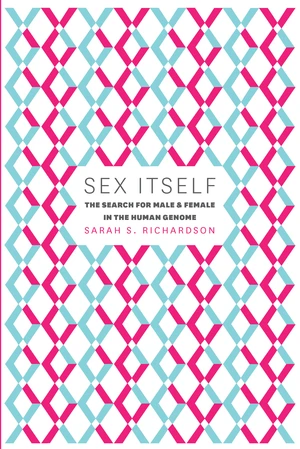Human genomes are 99.9 percent identicalâwith one prominent exception. Instead of a matching pair of X chromosomes, men carry a single X, coupled with a tiny chromosome called the Y. Tracking the emergence of a new and distinctive way of thinking about sex represented by the unalterable, simple, and visually compelling binary of the X and Y chromosomes, Sex Itself examines the interaction between cultural gender norms and genetic theories of sex from the beginning of the twentieth century to the present, postgenomic age. Using methods from history, philosophy, and gender studies of science, Sarah S. Richardson uncovers how gender has helped to shape the research practices, questions asked, theories and models, and descriptive language used in sex chromosome research. From the earliest theories of chromosomal sex determination, to the mid-century hypothesis of the aggressive XYY supermale, to the debate about Y chromosome degeneration, to the recent claim that male and female genomes are more different than those of humans and chimpanzees, Richardson shows how cultural gender conceptions influence the genetic science of sex. Richardson shows how sexual science of the past continues to resonate, in ways both subtle and explicit, in contemporary research on the genetics of sex and gender. With the completion of the Human Genome Project, genes and chromosomes are moving to the center of the biology of sex. Sex Itself offers a compelling argument for the importance of ongoing critical dialogue on how cultural conceptions of gender operate within the science of sex.
Price history
▲11.2%
Jan 29, 2023
€25.06
▲553.38%
Jan 28, 2023
€22.54
▼-86.24%
Jan 21, 2023
€3.45
▲14.22%
Jan 8, 2023
€25.06
▲536.09%
Jan 7, 2023
€21.94
▼-84.25%
Dec 31, 2022
€3.45
▼-12.63%
Dec 30, 2022
€21.90
Dec 24, 2022
€25.06

